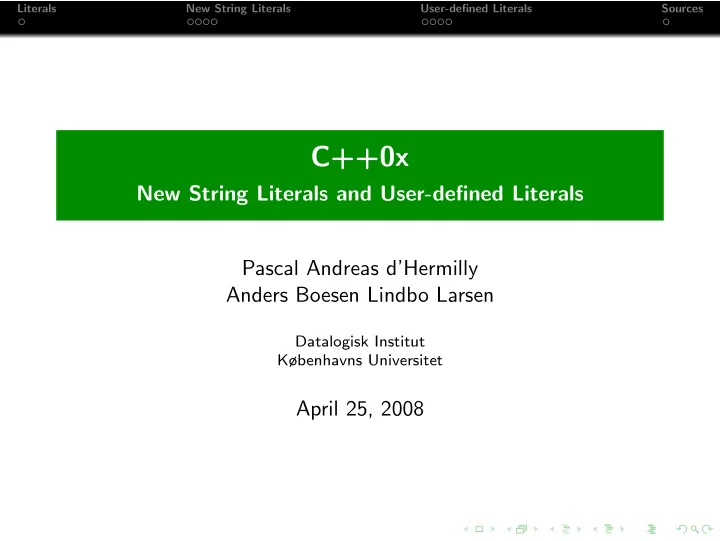

Literals New String Literals User-defined Literals Sources C++0x New String Literals and User-defined Literals Pascal Andreas d’Hermilly Anders Boesen Lindbo Larsen Datalogisk Institut Københavns Universitet April 25, 2008
Literals New String Literals User-defined Literals Sources Literals A literal is a notation for representing a value within source code, e.g.: ❼ "hello" (string) ❼ ’c’ (character) ❼ 14 (integer) ❼ 3.1 (double) ❼ 3.1f (float) We call the f in 3.1f the suffix modifier . The type of a literal is thus determined from its syntactic form. In the following we shall se how the C++ handling of literals is changed with C++0x.
Literals New String Literals User-defined Literals Sources String Literals ❼ Lots of demands for cross-platform functionality. ❼ Current standing for C++: not good, compared to e.g. java or python ❼ The language doesn’t use a standard character-encoding set for non-ascii, but only provides containers for the bits.
Literals New String Literals User-defined Literals Sources Current String Literals String literals is an array consisting of either: ❼ char ❼ wchar t Examples of current string literals: ❼ ”A string literal in double quotes” being a const char ❼ L”Example” being a const wchar t In C++0x, better support for Unicode will be introduced. Encodings that will be supported: UTF-8, UTF-16, and UTF-32
Literals New String Literals User-defined Literals Sources New String Literals New character types: ❼ char16 t ❼ char32 t Examples of new string literals: ❼ u8"UTF-8 string" ❼ u"UTF-16 string" ❼ U"UTF-32 string" using const char[] , const char16[] , and const char32[] respectively. Also inline insertion of unicode-codepoint will be available: ❼ u8"Unicode character: \ u2018 " The code that follows \ u is hex for a 16 bit Unicode codepoint. 32 bit, use \ U
Literals New String Literals User-defined Literals Sources Raw Strings Raw strings allow you to create strings without having to escape special characters. Examples: ❼ R"[ls /home/pascal/ | grep ".pdf" ]" ❼ R"delim[ls /home/pascal/ | grep ".pdf" ]delim"
Literals New String Literals User-defined Literals Sources User-defined Literals The current problem ❼ C++ recognizes literals only for the built-in data types, e.g.: integers, strings and booleans. ❼ These types are not sufficient to maintain C compatibility! (C99 has introduced new data types, that requires recognition of new literals) The goal of C++0x ❼ Make it possible to define new kinds of literal modifiers that will construct user-defined objects. ❼ C compatibility should be maintained as far as possible
Literals New String Literals User-defined Literals Sources Examples of User-defined Literals Some of the possibilities with user-defined literals: ❼ "hello"s ( std::string ) ❼ 3.5i (imaginary type for complex numbers) ❼ 10011011b (binary literals) ❼ 1234567890123456789xxl (arbitrary range/precision) Notice the use of suffixes to identify the literal type.
Literals New String Literals User-defined Literals Sources Proposed Solution Every user-defined literal is interpreted as a call to a new kind of operator (called literal operator ): X operator "suffix" ( parameters ); where X is the return type of the newly defined literal with the suffix suffix . parameters decides in which format the literal operator recieves the value of the literal. For example, the literal 3.5i will perform the following call: operator "i" ( parameters );
Literals New String Literals User-defined Literals Sources Examples of Literal Operators A cooked-form literal operator can have the following form: X operator "suffix" (unsigned int); For example: cm t operator "cm" (unsigned int); cm t n = 45cm; In this case, 45 is given as parameter to the literal operator. A raw-form literal operator can have the following form: X operator "suffix" (char const*); Example: long number operator "xxl" (const char*); long number n = 123456789012345xxl; In this case, the null-terminated C string "123456789012345" is given as parameter to the literal operator.
Literals New String Literals User-defined Literals Sources Sources The C++ Standards Committee, n2378 http://www.open-std.org/jtc1/sc22/wg21/docs/papers/2007/n2378.pdf The C++ Standards Committee, n2442 http://www.open-std.org/jtc1/sc22/wg21/docs/papers/2007/n2442.htm Wikipedia, C++0x http://en.wikipedia.org/wiki/C++0x
Recommend
More recommend